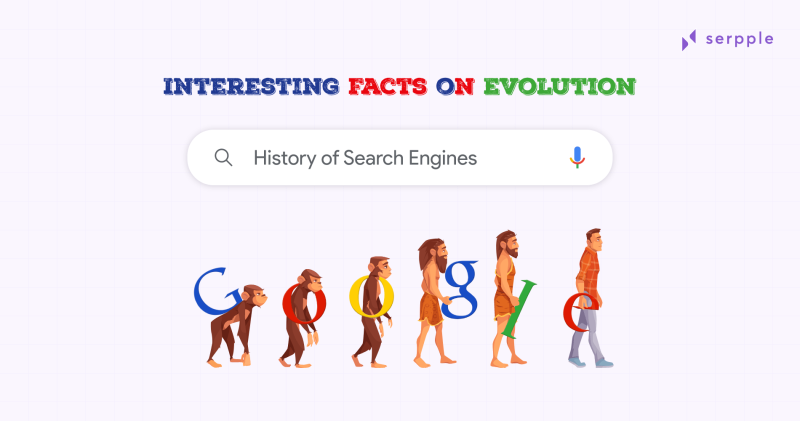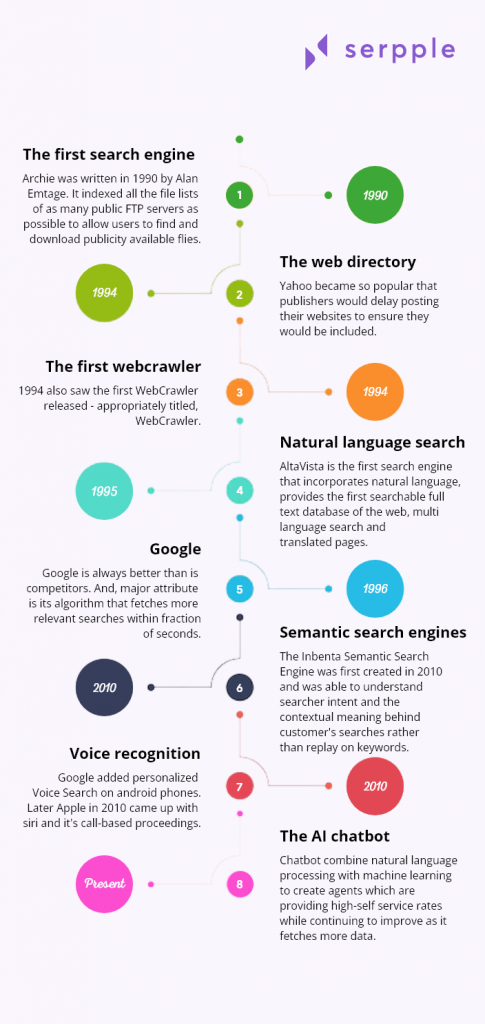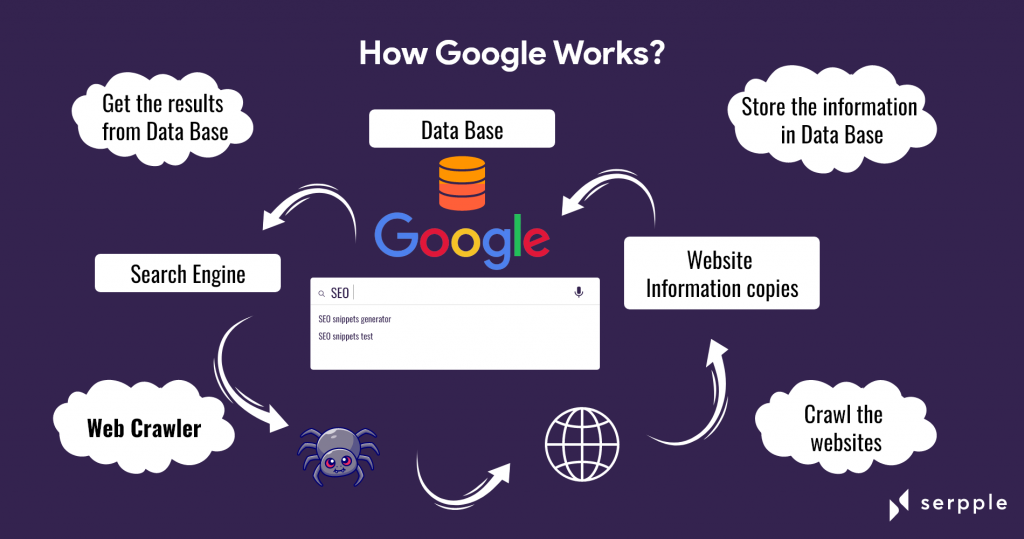
Interesting Facts on the Evolution and History of Search Engines
Adam White
Posted on September 27, 2023
I’m damn sure that everyone will be astonished to know how internet search engines work.
Because search engines display relevant data for our search queries, show our interesting topics and meet our wants in the form of ads, emails, etc.,
We do wonder at times, Do search engines read our mind?
Some like me may browse it out of curiosity and that is how I found a lot more amazing facts about the history of search engines.
There are mysterious self-operating spiders behind every search.
Does it make sense?
But yes, the spiders are actually bots.
To know more about how those spiders crawl, and how this reflects upon our search results just keep reading.
What are Search Engines and their Functions?
Before explaining what a search engine is, let me give you some examples of search engines for better understanding.
Google, Bing, Yahoo, and DuckDuckGo are a few search engines.
On reading this, you may feel that search engines have become the crux of our life. Yes, it is absolute.
Now, let’s dive into a more detailed explanation.
Search Engines provide Information for the users’ search in the form of web pages, videos, images, graphs, etc.,
This is totally a software process that gives data from WWW.
The search engines systematically arrange the data based on algorithms. These systematic arrangements are known as the Search Engine Result Page.
Can you believe it?
In this whole wide world, 63,000 users are searching per second on Google.
OMG!
Isn’t that a shocking fact? Try doing some math here to find out how many searches occur in an hour, a day, and a year.
I’m sure, You will be as perplexed as I’m.
What’s even more surprising is how it started.
Brief History of Search Engines
We all know that search engines are complex software systems.
The first search engine was founded in 1990.
But before 1990, several search engines were maintained manually.
In those times, humans participated in assisting the users by filtering the search result page.
The data that was provided may or may not be relevant to the query and also a limited number of result pages occurred.
Later, in 1990, Archie, the first search engine was launched which is purely automatic.
Alan Emtage, a bright student at McGill University in Montreal, was the one who invented this on 10 September 1990.
The purpose of that search engine was for FTP files.
It was able to browse only files and folders and not text.
After this search engine, Matthew Gray invented World Wide Web Wanderer in June 1993.
As in those periods, the web server was not popular.
So he invented it for the purpose of measuring the growth of the web.
Measuring the growth of the web is the main objective of the World Wide Web Wanderer.
Then he created the WWWW bot to count active web servers which were upgraded to count capture actual URLs.
As there is always room for improvement, WWWW leads a way for the creation of WWW which is now more eminent.
In 1994, Brian Pinkerton found the web crawler search engine, the first search engine designed for textual search.
This is the one that formulates users to search any words from any website and it became the standard for upcoming search engines.
This search engine was admired and celebrated by many people and got one million hits.
The same year, Lycos and Yahoo were also established in the market.
Yahoo was a web directory that collects web addresses. This search engine helps users to search websites based on their interests.
After that, Alta Vista was built and became popular in the year 1995.
It had both a textual search and a graphic image search.
This search engine robot was called Scooter, which is more effective in collecting data from three million websites per day.

In 1996, HotBot was contrived and gave data from Direct Hit Technologies.
The next was the most eminent and most used search engine in the world.
Yes, Google. It was formed in the year of 1998.
Undoubtedly, Google is the one that dominates the global search engine market share.
91.43% is the market value of google for 2022.
It dominates the other search engines through its search algorithms and provides a better user experience and interconnection of more web pages to a single search result.
In 2009, Bing came into existence and was launched by Microsoft.
Bing and Yahoo held hands together to compete with Google.
We know that competing with Google is harder. But Bing is the one which took second place.
DuckDuckGo was established in 2008.
It was mainly known for its privacy. It wouldn’t allow passing out the user’s data.
Yandex is a Russian search engine that was launched in 1997. This search engine’s market share in Russia in August 2022 is 48.18%.
And also in China, Baidu’s market share is 65.81% by August 2022. It was inaugurated by Robin Li and Eric Xu in 2000.
Ecosia emerged in 2009 and one of its goals is not for profit.
It uses its advertisement revenue to plant trees. They will plant a tree for every search.
Ecosia is unique in its goal.
We can see that creating a standard method is a tough row to hoe from the history of internet search engines.
Our ancestors always insisted we never forget our roots.
By not breaking that vow, we are reminding ourselves and preaching to our future.
This blog is also one of the ways to remind the history of search engines.
This evolution has made SEOs thrive in this high-tech world which began in the late half of the 20th century.
History of Search Engines Timeline
| S.NO | Search Engines | Launched Year |
|---|---|---|
| 01 | Archie | 1990 |
| 02 | World Wide Web Wanderer | 1993 |
| 03 | Web Crawler | 1994 |
| 04 | Alta Vista | 1995 |
| 05 | Lycos | 1994 |
| 06 | Yahoo | 1994 |
| 07 | HotBot | 1996 |
| 08 | Yandex | 1997 |
| 09 | 1998 | |
| 10 | Baidu | 2000 |
| 11 | DuckDuckGo | 2008 |
| 12 | Bing | 2009 |
| 13 | Ecosia | 2009 |
Having known the origin, now we’re gonna look into the functionality of search engines.
I’m pretty sure that more than looking back at the history of search engines, knowing how they work will be worth it.
How do Search Engines work for SEO?
The search engines have 3 main processes:
- Crawling
- Indexing
- Ranking
As I mentioned, there are spiders behind every search engine which are also known as spider bots,
With the help of their bots, google provides relevant information for each search query of every user
The spider bot crawls millions of websites and stores those data in massive databases.
Yes, the World Wide Web is stored in those databases.
As we all know indexing is the form of organizing the content according to specific metrics.
Likewise, search engines are using indexing to organize the content.
To give a quick response to users’ queries, indexing took responsibility.

Indexing works by collecting and parsing the content from WWW on the Search Engine Result page.
As we all know, there are so many web pages shown in SERP for a single search query.
This is all because of indexing.
Next, it’s Ranking
The web pages that are shown on SERP are actually arranged by the ranking method.
The rankings are based on content quality and clarity in order to give the relevant and best information for the users’ search.
Here are the best keyword tracking software that can help you track your rankings.
The outcome of SEO enhances the traffic to a website through the website’s technical layout, content relevance, quality and clarity, and link popularity.
To make the page more popular and easily findable, the web page is planned and worked according to the SEO strategy.
SEO has two kinds:
- On-page SEO
- Off-page SEO
On-page SEO is the action of improving our site quality by tweaking the content, titles, keywords, etc.
Off-page SEO is the action of promoting your website by back linking around the web and many more strategies.
On-page is directly controlled by ourselves by enhancing our site. But the other is not in our control. We can enhance our site ranking through inbound links, social media marketing, influencer marketing etc.
Search engines are mainly participating in ranking the site’s position on the result page.
Here is how to track your search engine rankings with ease.
Take Away
Hope the evolution and history of search engines made one point much clearer, history takes time to make a memory.
Undoubtedly, satisfying the users by giving them the best relevant data is what search engines do.
In more simple terms,
Optimized Website with unique Content => Ranking Frist in SERP.
This acts as a whole entity where one leans on the other.
Thus, irrespective of the niche every software business needs the rank tracker to monitor its organic performance.
Though there are many SERP trackers available in the market, Serpple is the most accurate keyword tracker that’s designed to be unique quality with rich data features.
It tracks your keywords’ position on the google search result page with 99.5% accuracy.
With this reliable simple rank tracker, you can track your keywords’ ranking positions across 189 regions.
So, explore this amazing tool.
Claim your free access for Serpple and start to smash your competitors with a powerful SEO strategy.
I'm Adam and I've been where you are
I understand the struggle of trying to get SEO traction when you are a small business competing with bigger companies.
That’s why I acquired Serpple. I wanted to provide an affordable tool to small businesses that would help you get the SEO help you needed.
Want to see how Serpple can grow your business?

Benefits of Serpple

More free traffic from SEO
With accurate rank tracking and actionable SEO tools you’ll make better decisions that will fly your website up the rankings!

More money In your pocket
Serpple is 6 SEO tools in one but at a price that is so much less than all of our competitors. You’ll save money every month!

Predictable business growth
As your pages climb up Google’s rankings you’ll get consistent growing traffic which will translate into more leads and customers.
Testimonials

Bryan Vorkapich
"I'm obsessed with checking my rankings every day on Serpple."

Miklos Sakoulas
"An Awesome Tool! It is so easy to track search ranking belonging to your keywords."

Jason Sampson
"Best affordable rank tracking tool around!"



How it works

Step 1: Start your free trial
Start your no-risk 14-day free trial to see if Serpple is right for you.

Step 2: Enter website info
Add your website and keywords into Serpple to get instant access to your rankings.

Step 3: Watch rankings grow
Use our SEO tools to make changes to your site and watch your rankings grow.
Serpple Features
- Rank tracker with daily updates
- Backlink monitor tool
- Keyword Research tool
- Track Unlimited Domains
- Ranking Reports
- Competitor Tracker
- Content Audits
- More tools coming soon
Ready to get started?
Published by
Adam White
Adam White is a 20+ year SEO professional who has optimized over 400 websites, built and sold over 20 internet and SaaS businesses all with SEO as the main traffic source. Follow him on Twitter/X
All stories by Adam White



Pingback: SEO for SaaS Companies - How to Increase Organic Growth?
Pingback: How To Optimize for Featured Snippets in 2024
Pingback: How to Analyze Serp Competitor Ranking in Six Steps - Serpple